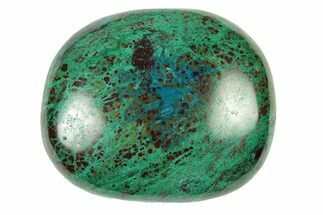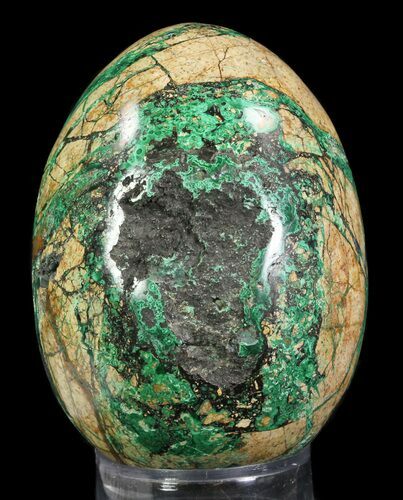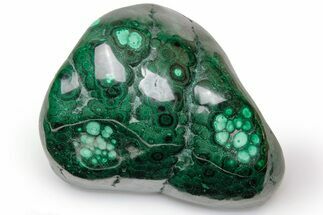This Specimen has been sold.
3.7" Polished Azurite & Malachite Egg - Peru
This is a beautiful, hand-polished "egg" containing brilliant green malachite and deep blue azurite from Arequipa, Peru. The lapidary work is very nice, and allows for the great, natural, botryoidal patterns in the mineral to be seen. It makes for a very aesthetic display piece. Comes with pictured display stand.
Azurite and Malachite are known to form in union with each other, for their chemical makeup is very similar. In fact, the presence of more or less water in the location of formation, is enough to determine whether an abundance of malachite over azurite, or vise-versa, will accumulate.
These minerals tend to be found near copper deposits, which accounts for the colors the minerals display.
About Malachite
Malachite is an intense green copper-based mineral that can be found in a wide variety of forms. Malachite can grow in botryoidal masses, stalactitic formations, and reniform formations, typically as a tight cluster of fanning fibrous needles that make up a seemingly solid mass. As layers continue to stack during formation, banded patterns can sometimes begin to take shape, explaining the rings in all shades of green seen on most polished malachite specimens.
Malachite results from the weathering of other copper ores, and is very often found associated with other copper-based minerals such as azurite and chrysocolla. It can be found in copper deposits around the world, but the Democratic Republic of the Congo is the primary source for polished malachite and mineral specimens.
Malachite has been prized since ancient times, first as a utilitarian copper ore, then as an ornamental stone. Due to its value as a decorative stone, it is rarely mined as a copper ore anymore.
Malachite is an intense green copper-based mineral that can be found in a wide variety of forms. Malachite can grow in botryoidal masses, stalactitic formations, and reniform formations, typically as a tight cluster of fanning fibrous needles that make up a seemingly solid mass. As layers continue to stack during formation, banded patterns can sometimes begin to take shape, explaining the rings in all shades of green seen on most polished malachite specimens.
Malachite results from the weathering of other copper ores, and is very often found associated with other copper-based minerals such as azurite and chrysocolla. It can be found in copper deposits around the world, but the Democratic Republic of the Congo is the primary source for polished malachite and mineral specimens.
Malachite has been prized since ancient times, first as a utilitarian copper ore, then as an ornamental stone. Due to its value as a decorative stone, it is rarely mined as a copper ore anymore.
Azurite and Malachite are known to form in union with each other, for their chemical makeup is very similar. In fact, the presence of more or less water in the location of formation, is enough to determine whether an abundance of malachite over azurite, or vise-versa, will accumulate.
These minerals tend to be found near copper deposits, which accounts for the colors the minerals display.
 Reviews
Reviews














